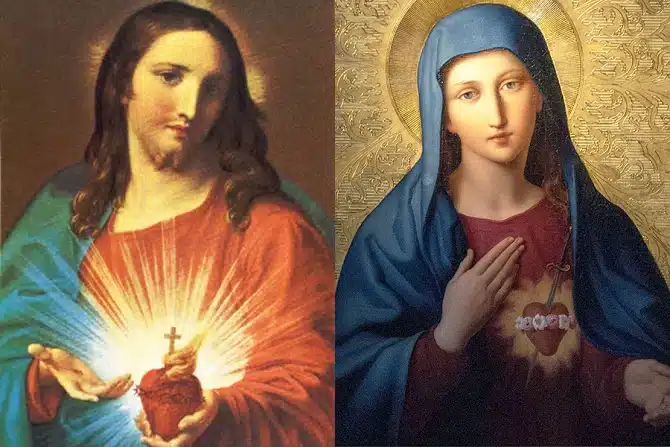A poster for a theater play presented by students of a Catholic university in Lima, combining religious symbols with the image of a man wearing female clothing, has sparked outrage in Peru.
The banner for a production titled <em>María Maricón</em> (translated as "Faggot Mary" in Spanish) depicts a halo and a sacred heart associated with a man wearing a feminine veil and makeup.
The play, part of a festival organized by the Pontifical Catholic University of Peru’s (PUCP) College of Theater, was originally scheduled for January 30–31.
Described as a “testimonial theatrical work,” it explores the “conflict between religion and gender through the deconstruction of various Catholic virgins and saints.” It incorporates folkloric dances, chants, religious and popular texts, and the personal experiences of the lead performer, who identifies as homosexual.
Last week, a picture of the poster was sent to Carlos Waite, leader of the Men’s Rosary group in Peru. He shared it on X (formerly Twitter) with strong criticism, and it quickly went viral.
“Every Catholic in the country saw it as blasphemy. It insulted millions,” Waite told Crux.
The next day, Waite organized a protest with the Men’s Rosary and other Catholic organizations—he claimed 500 people attended—at the university. They prayed the rosary as an act of reparation for the “disrespect” shown to Catholic symbols.
“We’ll keep putting pressure on the university until that presentation is canceled,” Waite added.
The backlash extended to the political sphere. Several members of Congress urged the university and the government to take immediate action to prevent the play’s performance. Lima’s conservative Catholic mayor, Rafael López Aliaga, was among the most vocal critics.
“The Catholic University of Peru cannot bear ‘Catholic’ in its name and at the same time promote blasphemy against the Mother of God,” he said at a press conference. The banner prominently featured the PUCP name and logo.
In response, the university postponed the festival to March and announced a review of its procedures for publishing promotional materials. Faculty and students involved in the event were called to meet with administrators.
Cardinal Claudio Castillo, Archbishop of Lima and PUCP’s grand-chancellor, issued a statement expressing his “deepest indignation and repudiation” of the “insulting publicity towards our Christian faith.”
He also remarked that “while there are those at PUCP who trivialize our faith, there are also sectors within the Church that claim to be Catholic while transforming faith into an ideology to dominate and destroy people. For instance, some have dedicated themselves to amassing wealth under a distorted interpretation of the agreement between the Holy See and the Peruvian State.”
This comment appeared to reference the Sodalitium Christianae Vitae (SCV), a once-powerful Catholic group with significant influence in Peru, whose founder and leaders were implicated in sexual and spiritual abuse. Founder Luis Fernando Figari was removed from the group and sent to the Vatican. Media reports suggest the SCV is nearing dissolution, adding to the current tensions.
The Peruvian Bishops’ Conference will soon hold general elections, and Castillo’s role as a key figure has drawn opposition from conservative factions, who see the controversy as an opportunity to shift leadership.
“The banner offended the popular devotion to the sacred hearts of Jesus and Mary, which are deeply significant in Peru,” said theologian Veronique Lecaros, head of PUCP’s Theology department.
“Even people who don’t attend Mass are devout to the sacred hearts. That poster touched a very sensitive chord,” she said.
While Lecaros emphasized the university’s commitment to open debate, she criticized the banner for failing to foster dialogue and simply causing offense.
She also pointed out that the professor responsible for the festival should have discussed the content with students before publication.
“In Peru, homosexuality remains a more contentious issue for many Christians than even abortion. Traditionalist Catholics have exploited the confusion to advance their agenda,” Lecaros concluded.
<em>(Photo: Sacred heart of Jesus by Pompeo Batoni Public domain Wikipedia and Immaculate heart of Mary by Leopold Kupelwieser Credit Diana Ringo Wikipedia)</em>



